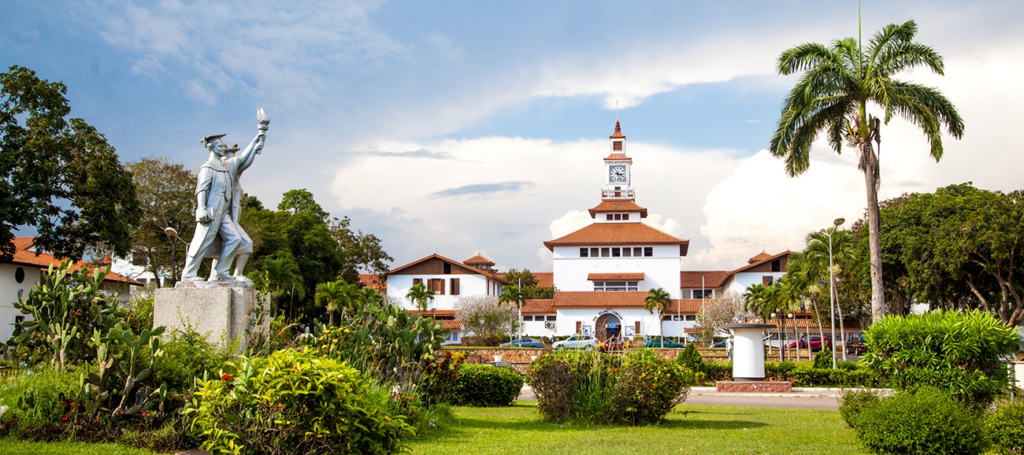
The University of Ghana has emerged as the top-ranked university in Ghana and the second-best in the West African sub-region in the inaugural Times Higher Education (THE) Interdisciplinary Science Rankings 2025, placing 187th globally.
The ranking positions UG among the world’s top 200 institutions recognised for excellence in advancing interdisciplinary science research that addresses complex global and societal challenges.
The rankings, developed in partnership with Schmidt Science Fellows, assessed 749 universities from 92 countries and territories, measuring institutional commitment to interdisciplinary scientific research across three stages of the research life cycle, including inputs, process and outputs.
UG recorded strong performances in outputs, which covers research quality, interdisciplinary publication impact and reputation and inputs, reflecting research funding and industry collaboration. Under the process pillar, UG was measured for internal support structures, facilities and promotion pathways for interdisciplinary teams.
This recognition follows the launch of UG’s new Research Strategy in 2024, which is anchored in the broader 2024–2029 Strategic Plan. UG’s Strategic Plan identifies “Impactful Research” as its second strategic priority, designed to position the University as a leader in globally-relevant, locally-grounded research. A key objective is to strengthen interdisciplinary approaches and raise funding, both locally and internationally, for collaborative scientific and social research.
Commenting on the new achievement, Vice-Chancellor, Prof. Nana Aba Appiah Amfo, noted that the University’s inclusion in the top 200 of the global rankings reflects its long-term commitment to excellence in interdisciplinary research and academic innovation.
“This latest ranking places our University on a strategic trajectory toward achieving its vision of global impact through innovative research, teaching and learning, using a technology-driven and people-centred approach. We remain committed to knowledge production that addresses complex societal challenges,” she stated.
She added that the recognition also reflects the broader institutional culture of academic rigour and collaboration. “This achievement recognises our commitment to innovative, cross-disciplinary research and academic excellence. It is a clear indication of the hard work and dedication of our researchers and staff and underscores our strategic vision to be a leader in research both in Africa and globally.”
The Vice-Chancellor further acknowledged the collaborative efforts behind the milestone, saying, “We also extend appreciation to our strategic partners and donors who have supported the work of our researchers. This is also a recognition for our faculty, staff and students across various departments, institutes and centres. We hope to do more in the coming years with the right environment and support for our researchers.”
The Times Higher Education (THE) Interdisciplinary Science Rankings assess universities worldwide based on their contributions and commitment to interdisciplinary scientific research. The methodology applies 11 carefully calibrated metrics across three pillars that reflect the entire research life cycle.
These include Inputs (19%), which measure the proportion of science research income devoted to interdisciplinary projects and industry funding per science researcher; Process (16%), which considers institutional support structures such as facilities for interdisciplinary teams, administrative backing and promotion policies; and Outputs (65%), which evaluate interdisciplinary publication output, research quality (through citation metrics), usefulness across fields and institutional reputation among global researchers.
The rankings are underpinned by a robust and credible evidence base, including 157 million citations drawn from 18 million research publications, survey responses from more than 20,000 scholars worldwide and validated data submitted directly by institutions. This comprehensive approach ensures that the results offer a reliable snapshot of how well institutions are enabling and advancing interdisciplinary research globally.
At the global level, the Massachusetts Institute of Technology (MIT) claimed the top spot, followed by Stanford University and the National University of Singapore. Within Ghana, the University of Ghana emerged as the highest-ranked, asserting its authority as Ghana’s leading university for interdisciplinary science research.
The inclusion of UG among the top 200 globally reinforces its growing international profile and validates ongoing efforts to promote innovation, build research capacity and create enabling systems for interdisciplinary inquiry.
This performance also reflects the successes of the ongoing implementation of the University’s 2024 Research Strategy and Strategic Plan (2024–2029), which prioritises impactful research and institutional collaboration aimed at solving complex global challenges.
DISCLAIMER: The Views, Comments, Opinions, Contributions and Statements made by Readers and Contributors on this platform do not necessarily represent the views or policy of Multimedia Group Limited.
DISCLAIMER: The Views, Comments, Opinions, Contributions and Statements made by Readers and Contributors on this platform do not necessarily represent the views or policy of Multimedia Group Limited.


